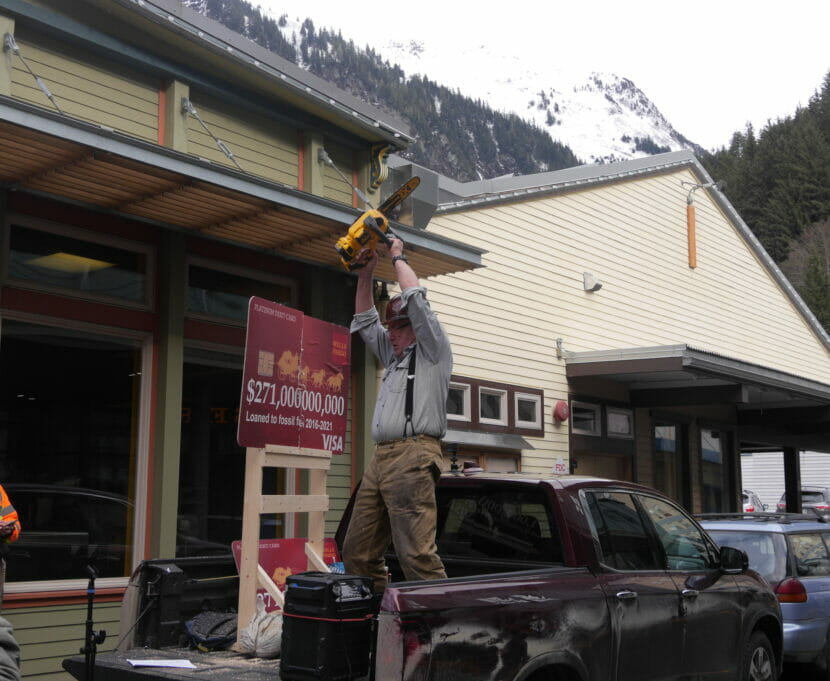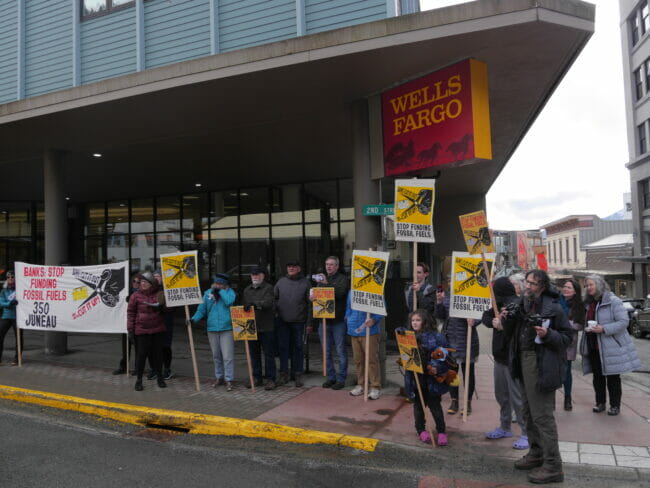
The buzz of a chainsaw and a low, steady drum beat drew attention to the Wells Fargo bank in downtown Juneau on Tuesday, where about two dozen demonstrators lined the sidewalk.
On the bed of a pickup truck, Bob Schroeder stood before a plywood model of an Alaska Airlines credit card.
“What do we say?” Juneau organizer Doug Woodby called out. “Cut it out or we’ll …”
“Cut it up!” the crowd responded.
Schroeder revved the chainsaw over an intensifying drumbeat and then sliced the card in two, tossing the pieces onto the street.
What organizers called the “Great Alaska Credit Card Chainsaw Massacre” was one of more than 100 protests on Tuesday for the national “Stop Dirty Banks Day of Action.” Demonstrators aimed to draw attention to the connection between the fossil fuel industry and big banks like Wells Fargo, CitiBank, Chase Bank and Bank of America, the owner of the popular Alaska Airlines credit card.
The protests called on the banks to end their investments in oil and gas expansion. Together, those four banks have invested more than a trillion dollars in fossil fuels since 2016.
“That’s a lot of money,” Woodby said after the demonstration. “And I think that a lot of people probably don’t realize just how integral big banks are to funding the climate chaos experience.”
Retirees lead the way
That was true for many of the protestors in Juneau. Sally Wilson has had a Wells Fargo account for more than 30 years. She said she’s been satisfied with it, but after learning about where her money is being invested, she’s reconsidering her choices.
“I had separated the two things,” Wilson said. “My money management is one part of my life. My concern about climate change is another part of it. And this is linking the two.”
Kate Troll agreed. She said she’s already made conscious choices about her financial portfolio, deciding to move money to things like renewable energy investments. The next step, she said, might be ditching her Alaska Airlines credit card.
“We love the miles,” she said. “But I think we have to think about the greater trade off.”
Both Wilson and Troll are retirees, along with many of the nation’s demonstrators yesterday. The protests were organized by Third Act, an activist group for older adults founded by climate journalist and advocate Bill McKibben.
That demographic is well-suited to lead the charge against banks. Seventy percent of U.S. wealth is held by Americans over 55.
Woodby says that appealing to big banks is a more promising avenue than pleading with oil companies directly.
“We’re customers. They listen to us, hopefully. And they know that they depend on us,” he said. “They have a choice. The banks can loan for other uses, like renewable energy.”
Willow Project a rallying point
Alaska was at the center of a national debate on fossil fuel expansion earlier this month, when the Biden Administration approved the Willow Project, a major ConocoPhillips oil drilling project on Alaska’s North Slope.

The project, which received bipartisan support from state legislators, will emit more than 287 million metric tons of carbon dioxide over its 30-year operation — the emissions equivalent of more than 70 coal fired power plants.
And much of the project’s financing will likely come from huge banks. ConocoPhillips has received $10 billion from these four banks since the signing of the Paris Agreements.
Wanda Kashudoha Loescher Culp, an Alaska Native activist with Women’s Earth and Climate Action Network, spoke at the event, reminding demonstrators that the history of bank-funded resource extraction in Alaska dates back before the fossil fuel industry moved in.
“Our ancestors witnessed first explorers and then the expeditions taking our resources for business. All of this was bank funded,” she said.
And while moving away from fossil fuel expansion will be challenging in a state that relies on it so heavily, she said it’s an issue of environmental justice. She believes the state has prioritized resource extraction over the environment and human health.
“Alaska has never been a government of the people, it’s always been corporate oriented,” Culp said. “And we need to change that.”
Woodby and national Third Act leaders encouraged demonstrators to sign a pledge to close their accounts if banks don’t commit to end their oil and gas investments. Before Tuesday’s day of action, the pledge had over 17,000 signatures nationally.
